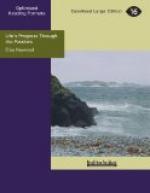Natura, on the other hand, was so overcome with the unhoped-for gentleness of his behaviour, that he burst into a flood of tears.—Filial gratitude and love, joined with the thoughts of what he had done to deserve a far different treatment, so overwhelmed his heart, that he could express himself no other way than by falling on his knees a second time, and embracing the legs of his father, with a transport, I know not whether to say of grief or joy; continued in that posture for a considerable time, overwhelmed at once with shame, with gratitude, and love:—at length, gaining the power of utterance,—’O sir,’ cried he, ’how unworthy am I of your goodness!’—but then recollecting as it were somewhat more; ’yet sure,’ pursued he, ’it is not possible you can forgive me all.—I have been guilty of worse than, perhaps, you yet have been informed of:—I am a wretch who have devoted myself to infamy and destruction, and you cannot, nay ought not to forgive me.’
The father was indeed very much alarmed at this expression, as fearing it imported his distresses had drove him to be guilty of some crime of which the law takes cognizance.—’I hope,’ said he, ’your having signed a contract with an abandoned prostitute, is the worst action of your life?’
It is impossible to describe the pleasure with which Natura found his father was apprized of this affair, without being obliged to relate it himself, as he was now determined to have done:—all his obduracy being now intirely vanquished, and converted into the most tender, affectionate, and dutiful submission.
‘Can there be a worse?’ replied he, renewing his embraces, ’and can you know it, and yet vouchsafe to look on me as your son!’—’If your penitence be sincere,’ said the good old gentleman, ’I neither can, nor ought refuse to pardon all:—but rise,’ continued he, ’and freely give this worthy friend and myself, the satisfaction we require;—a full confession of all your misbehaviour, is the only attonement you can make, and that I can expect from you:—remember I have signed your pardon for all that is past, but shall not include in it any future acts of disobedience, among which, dissimulation, evasion or concealment, in what I demand to be laid open, I shall look upon as of the worst and most incorrigible kind.’
He needed not have laid so strong an injunction on the now truly contrite Natura;—he disguised nothing of what he had done, even to the mean arts of gaming, to which he had been obliged to have recourse after his voluntary banishment from all his friends; and then painted the horrors he conceived at the things he daily saw, and the despair which had induced him to leave England, in such lively colours, that not only his father, but the merchant, were affected by it, even to the letting fall some tears.
But not to be too tedious in this part of my narration, never was there a more perfect reconciliation:—the father till now knew not how much he loved his son, nor the son before felt half that dutiful affection and esteem for his father.




